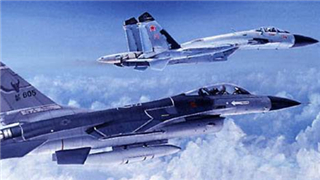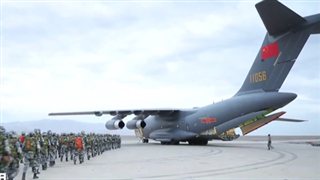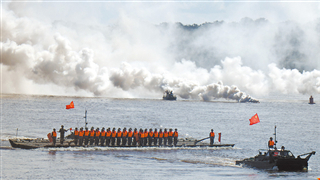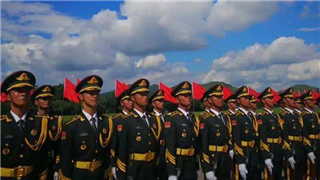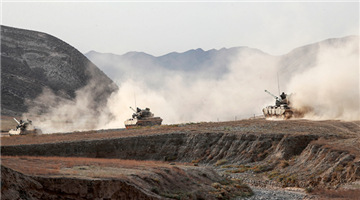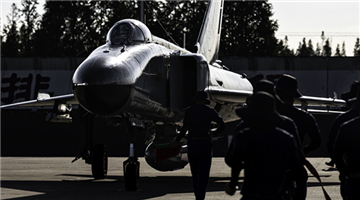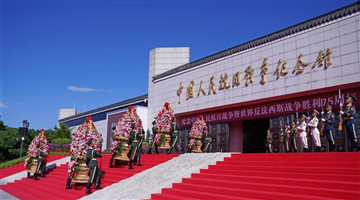By Zhang Chi
As the world’s biggest arms dealer, the US has constantly ripped off its allies through international arms deals in recent years, which has not only exposed its unilateral and hegemonic thinking but will also negatively affect its relationship with the allies.
Japan has repeatedly fell victim to US ripping off.
Japan is America’s important ally in Asia and also a key arms trade partner. In July 2020 alone, Washington approved the sales of 105 F-35 fighter jets in the total worth of 2.48 trillion Japanese Yen (23.1 billion US dollars) to Tokyo, but Japanese media have reported that arms deals like this and the bilateral joint weapon R&D have “hurt Japan deeply”.
First, these arms deals come with large amounts of kickbacks. The Japan Economics Newspaper reported that the US government demanded Japan to pay part of the labor cost on the American side when buying the defense equipment, in addition to an extra fee equivalent to 3.2% of the contract value in the name of “handling expenses”. It is learned that the Japanese government has paid more than 100 billion Yen (about 0.94 billion US dollars) kickbacks over recent years.
Second, the weapons and equipment are delivered with a serious delay. It takes several years from contract signing to official delivery when buying weapons and equipment from the US, sometimes with years of delay, according to an official from the Japanese Ministry of Defense. By the end of the 2018 fiscal year, 132 items in the US-Japan arms sales contracts were not delivered, amounting to 32.6 billion Yen(about 0.3 billion US dollars).
Third, American products are of poor quality. Take the F-35 fighter jet for example. The Japan Air Self-Defense Force (JASDF) began to deploy this kind of aircraft in 2018 but a crash accident happened in April the next year, during which the aircraft had “spatial disorientation” when flying at a high speed and the pilot plunged into the sea due to misoperation. Because of the accident, the US army in July that year installed on their F-35 fighters the anti-crash device originally scheduled to be installed in 2026.
Fourth, weapons and equipment from US have a poor reputation. Japanese media claimed that the historical lesson that Japan has learned from the experience of jointly developing the F-2 fighter jet with the US proved “how untrustworthy Americans are”. The Japanese chief designer of the F-2 fighter previously said that during the joint development, the American side didn’t open up their technological secrets to Japan, but instead obtained many exclusive technologies from it. What’s more infuriating was that even when American technicians found that the Japanese team had made mistakes during research and development, they didn't tell their Japanese counterparts.
There are no exceptions for other US allies.
Foreign media reported that the US has not only ripped off Japan through arms deals but also did the same to other allies.
First, the US has forced arms deals upon other allies. Take the KC-46 refueling plane for example. The US air force has repeatedly found spanner, garbage and other processing leftovers in the plane. This kind of low-level problem seriously threatens flight safety and has caused the plane’s suspension several times. Yet the US still forced Israel to spend USD2.4 billion buying eight KC-46 refueling planes with quality defects and coerced it into abandoning the plan to independently retrofit the plane or purchase similar products from Europe.
Second, the US sells shoddy products. America’s European ally Ukraine has the first-hand experience in this. In 2015, the Ukrainian government force complained about the substandard quality of America’s Humvee armored vehicles, most of which were used ones produced in the 1980s with outdated tires and plastic windows and doors. In 2018, the Ukraine military design bureau revealed that the US-made Javelin anti-tank missiles had long outlived their service life, and they couldn’t be actuated during Ukraine’s military exercise.
Third, the US has made a regular exhibition of itself by its weapons and equipment. The ROK military bought Apache Attack Helicopters from the US at an extremely high price in 2013 and began to commission them in 2017, only to find that the helicopter’s radar system had a high error rate. It made constant mistakes when marking land targets, either omitting targets or marking non-existent ones, and was unable to detect water targets.
Another example is that Saudi Arabia once bought a large number of Patriot air defense systems from the US at a high price too, and deployed 88 sets of the system on its northern border. Yet when the country's two oil facilities were attacked by drones and patrol missiles on September 14, 2019, none of the Patriot systems deployed nearby gave any response. The US Secretary of State Pompeo explained awkwardly that the air defense system was intermittent and that even the finest system in the world couldn’t always hit the target.
Despite its colossal volume of arms deals and powerful military industry, the US’ repeated “tricks” when selling weapons and equipment to its allies have exposed to the fullest its hegemonic mindset of “America First” and bigoted unilateralism.
